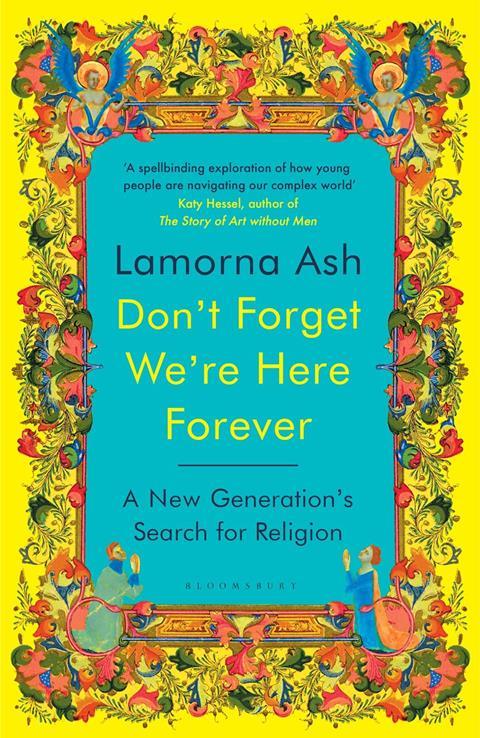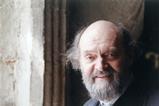What draws Gen Z to Christianity and what might they find there? In Don’t Forget We’re Here Forever, Lamorna Ash explores faith with honesty, depth and a storyteller’s eye, offering an intriguing glimpse into a generation’s spiritual searching, says Derek Walker

Lamorna Ash had her interest in faith piqued when she heard that a comedy double act from her university days had simultaneously become Christians and wanted to become priests. She was “no Christian, no theologian, no philosopher,” and had the usual assumptions that Christianity is: “aligned with all kinds of malignant social positions.” Wishing to understand what made the duo and others in their 20s and 30s want to convert, she wrote an article in The Guardian. When she realised how much more there was to discover, she turned her fascination into a book, published yesterday, Don’t Forget We’re Here Forever: A New Generation’s Search for Religion (Bloomsbury Publishing).
Ash has no agenda beyond seeking truth and understanding. She explores the lives of Christians in her age bracket across a range of denominations, from Orthodox to Quaker, interviewing widely and conducting in-depth research. She also immerses herself in Christian community, beginning with a six-week Christianity Explored course. As we journey with her in the book, we experience her reactions firsthand. Ash is candid and unfiltered, her honesty balanced by a clear respect for others. In the process, we gain insight into how Christians can be perceived, positively or negatively to those unfamiliar with the faith. She may be just one voice, but her perspective offers a valuable window into the worldview of Gen Z.
Ash draws on the Genesis story of Jacob wrestling with the angel - both the biblical account and Sir Jacob Epstein’s striking 2.5-tonne alabaster sculpture at the Tate, to frame her own struggle to come to terms with faith in God. At the start of her research, she joked: “Can I become a Christian in a year?” - though part of her feared it wasn’t entirely a joke. Ash began the experiment believing that faith might compromise who she was, that it would clash with her core beliefs and shrink her life.
Despite the warmth of those around her, the conservative, literalist tone of Christianity Explored (and its co-founder Rico Tice) reinforced that fear. It angered her enough that, if not for her commitment to a full year of research, she might have walked away. “I learned some amazing things while at Christianity Explored,” she writes, “when I was not…too deaf through my anger to listen for them.” Ash stayed at the missionary organisation’s YWAM’s Discipleship Training School, where the theology echoed that of Christianity Explored, but: “the form of faith at YWAM felt more energetic, intense and corporeal.” However, occasional encounters with such narrow religion seemed so far from her normal life that they felt: “unsolid, like those dreams lost upon waking.” Nevertheless, she took to retreats to engage more intensely. Less viewing, more being.
A work week on the island of Iona, where inclusive values aligned more closely with her own, began to chip away at her defences. “I cried almost every service. Could you call that faith, the letting-go of reason, a momentary burning of the heart?… I longed for our hours in the church like hunger.” Later, a spell with nuns over Easter at Walsingham saw her return to a more observational, Louis Theroux-style mode of reporting, and then it was back to full immersion at St. Beuno’s in Wales, where a silent retreat and the faith of poet Gerard Manley Hopkins drew her deeper still. After this, she met people who had deconstructed their mainly charismatic conservative faith, but still believed.

It’s clear from her writing that, in just one year of research, Ash absorbed both the historical roots and present-day spirit of Christianity - perhaps more deeply than those familiar with only one tradition. Emperor Constantine, Mike Pilavachi, the Nine O’Clock Service, Eugene Peterson, Kanye West’s Jesus is King, Premier Christianity, the Asbury Revival and Lectio Divina are all familiar to her. She understands the 1920 split in British evangelicalism that gave rise to the conservative/liberal divide and has explored global Church history and equally striking is her grasp of scripture - she writes like someone who knows her way around the Bible, its imagery, and the threads that connect it.
You can always tell when a writer reads widely and knows how to tell a story well. Her first book, Dark, Salt, Clear: Life in a Cornish Fishing Town, which won the Somerset Maugham Award in 2021, is proof of that. At times, the would-be novelist in Ash overtakes the commentator, spilling descriptive prose across the page.
Some may be tempted to pin down her stance by the final page, but her journey doesn’t end just because the book does – and it’s the richness of that journey so far that makes it compelling, especially for readers coming from a different theological angle. While the selection of interviewees can feel a little scattergun at times, this remains near-essential reading for anyone hoping to understand how Gen Z might approach faith.
Don’t Forget We’re Here Forever by Lamorna Ash is out now







































No comments yet